
The average person searches Google three to four times per day and spends over half an hour on Facebook.
If you want your ads to be seen, you need to go where the people are. In 2021, that’s Google and Facebook.
Google Ads and Facebook Ads are both top PPC networks with incredible reach. They’re both affordable for businesses of all sizes and effective at bringing in traffic and conversions.
But which one is better?
While there are advantages to each, choosing the right PPC platform is key to getting the most from your advertising investment.
This article goes through the differences between Google Ads and Facebook Ads, the pros and cons of each, and which one is best for your business.
What are Google Ads?
Google Ads are everywhere.
Most people are familiar with the ads based on search terms that appear at the top of the search engine results. Sometimes they’re text ads, and sometimes they show listings for a product you searched for.
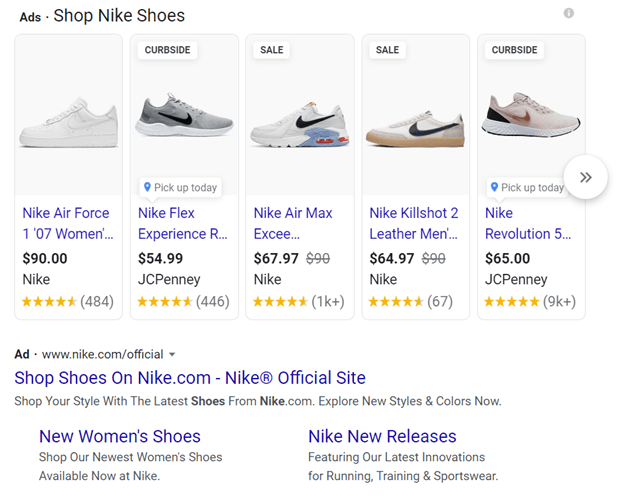
But Google’s reach goes far beyond the SERP to include display ads on a vast network of websites, apps, and even videos on YouTube.
You may be familiar with the name AdWords. It was once known as Google AdWords before being rebranded to Google Ads in 2018.
What are Facebook Ads?
Facebook Ads are paid advertisements or posts that appear in users’ news feeds and elsewhere on Facebook.
Many Facebook Ads are designed to blend in with content from friends or pages that the user follows.
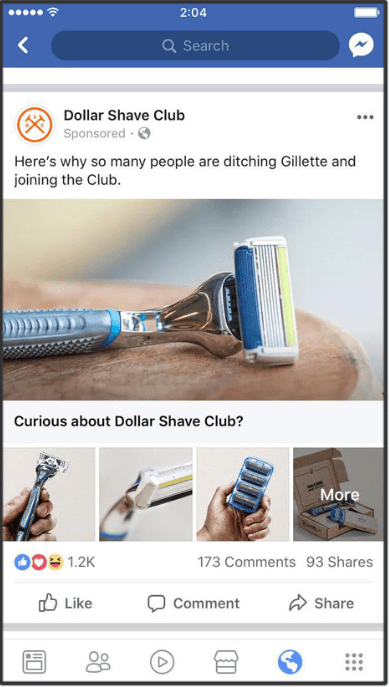
Most Businesses Struggle Making PPC Profitable…We Fix That
Since 2009, we have helped hundreds of businesses generate more online leads and sales through PPC. Let us do it for you!
Why should you advertise on Google Ads or Facebook Ads?
Both Google Ads and Facebook ads are PPC (pay-per-click) networks. PPC ads are popular with marketers — 74% of brands and 79% of agencies say that PPC advertising is a huge driver for their business.
There are several reasons PPC is an important part of the marketing mix.
It’s cost-effective, for starters. Since you only have to pay when your ad is clicked, it works for any budget.
PPC advertising has a low barrier to entry and often gets quick results. Compared to SEO, which typically takes months to produce results, PPC ads can start bringing in traffic right away.
Running ads can also be a great source of information on your potential customers. For example, you can test what sort of images in ads lead to the most conversions.
There’s no doubt that pay-per-click advertising can benefit your business. You just have to decide which network to use.
What makes Google and Facebook the top two choices for PPC?
On average, people encounter approximately 6,000 to 10,000 ads every single day.
With so many ads appearing to your target audience, it’s harder than ever to create the one that has a real impact. A good start is to pick the network that can show your ad to the most people.
According to Google, the Google Display Network reaches over 90% of internet users, and Google Ads display on 650,000 apps. Facebook, meanwhile, has over 2.7 billion monthly active users.
No matter what you’re selling, you have potential buyers using Google and Facebook.
Both networks put ads right where people are looking. A person searching Google will automatically look at the top of the SERP, where they’ll see a Google Ad. A Facebook user scrolls through their feed looking at each post, some of which are Facebook Ads.
No other PPC platforms have the reach that Google and Facebook do.
What’s the difference between Facebook Ads and Google Ads?
Facebook Ads and Google Ads have a lot in common, but also some key differences. To make the best choice, you should understand the fundamental differences between paid search advertising and social media advertising.
Paid search vs. paid social
Google Ads offers more than its search network, but its primary strength is putting your ads at the top of the SERP. Paid search is focused on showing ads that match the user’s search intent.
Facebook Ads reach out to groups of users in its social space. People log onto Facebook expecting to see content specifically tailored to their interests and lifestyle. A well-targeted Facebook Ad can be part of that.
Types of ads
Paid search ads on Google are wonderfully simple. All it takes is some text, and you have an ad.
Social media advertising is all about high-quality images and video. This is both an advantage and disadvantage for Facebook Ads over Google Ads. A text ad is easier to create but also easier to ignore than a stunning, high-resolution image.
Of course, Google offers more than paid search. If you’re looking for variety in ad choices, Google is your network. Google Ads include:
- Search ads: Text ads are shown to people searching for specific keywords. They can be generic keywords, your own brand name, or competitor brands.
- Display ads: Image ads are displayed on the many sites in the Google Display Network.
- Video ads: Ads that display on YouTube and other video websites.
- App ads: Ads to drive installs, engagements, and signups for your app.
- Shopping ads: Ads that promote online and local inventory at the top of the search page.
- Local ads: Campaigns designed to bring people to physical stores and venues.
- Smart Campaigns: Create quick ads. Google’s technology finds keywords and decides the optimal way to target them. They appear on both the Search and Display networks.
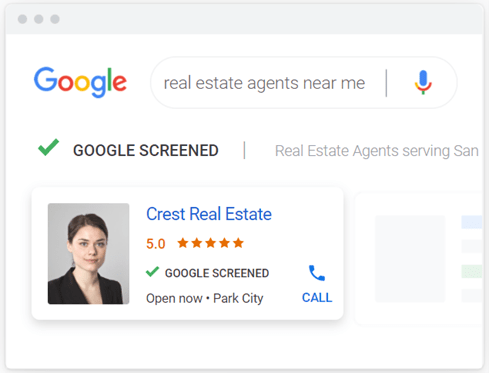
Facebook Ads appear in various locations throughout the Facebook network, including in Facebook and Instagram feeds, Facebook Marketplace, Facebook Messenger, and more. They can even appear outside Facebook and Instagram on apps in the Facebook Audience Network.
However, the reach of this network is not nearly as vast as Google’s.
The ad types are very visual and include:
- Image ads: Ads based on a single image.
- Video ads: Ads based on a video.
- Carousel ads: Ads that showcase up to 10 images or videos in a single ad, each with its own link.
- Instant experience: A full-screen, interactive experience that opens after someone taps an ad on a mobile device.
- Collection ads: Ads featuring multiple products that each open as an Instant Experience.
Targeting options
Paid search targeting is focused on keywords, while paid social targeting uses interests and demographic groups.
Google Ads does allow you to target based on demographics. However, the categories are fairly basic. Its strength is in targeting based on search intent.
Facebook Ads targeting, on the other hand, can get very granular.
Facebook knows a lot about its users and their location, interests, lifestyles, values, demographics, and behaviors. You can target your advertising campaign based on a combination of these factors to reach your ideal audience.
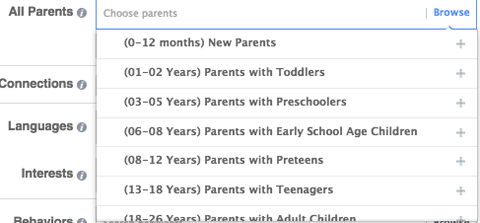
Both PPC platforms also allow you to advertise to people who’ve visited your site in the past.
Buyer intent vs. brand awareness
An internet user wants to buy a product just like yours. They type a description of the product into the search bar, and voila! The name of your product and a link to your website appear at the top of the search results.
The beauty of Google Ads is that it reaches customers who already have the intent to buy your product or something similar.
But not every potential customer is looking for you right now. Paid search makes it hard to put your ads in front of an audience that doesn’t know about your type of product or service. They’re not searching for you — but they might be interested if you could reach them.
Facebook Ads excel at brand awareness, especially if you can correctly identify the groups of people that are likely to be interested in your company.
Put a compelling Facebook Ad into their newsfeed, and they might discover that your product is the thing they never knew they needed.
Most Businesses Struggle Making PPC Profitable…We Fix That
Since 2009, we have helped hundreds of businesses generate more online leads and sales through PPC. Let us do it for you!
Which PPC network has a better ROI?
Sorry, no easy answers here.
Both networks can provide a great return on investment — if they’re right for your needs. Here are a few questions to ask yourself to find the best PPC platform.
Are many people searching for your product or service?
For your ads to appear at the top of the search engine results page, someone has to be searching your keywords.
You can use Google’s Keyword Planner or another keyword research tool to find out if the keywords related to your product have substantial search volume. If they do, running a Google Ads search campaign might be a great way to direct some of that traffic right to your site.
But if you need to spread awareness of your product before anyone will search for it, try Facebook.
How costly are your keywords on Google Ads?
Put your keywords into the Keyword Planner to get an estimate of the cost-per-click (CPC) for each. You’ll probably have to pay for a lot of clicks to get a conversion. Can you afford your most relevant keywords?
This will vary greatly by industry. The highest average cost-per-conversion is in the computers and electronics industry at $101.40, while the lowest average cost per conversion is in the auto industry at $26.17.
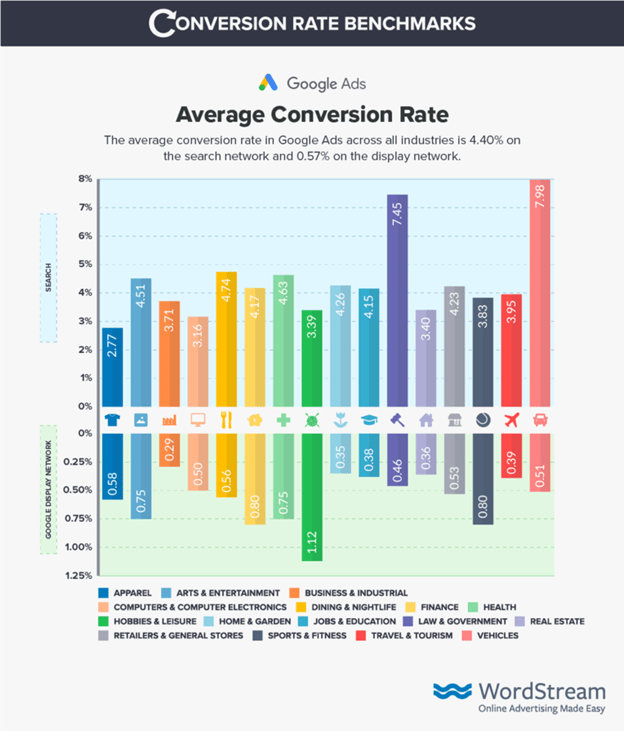
Which advertising network is less expensive will depend on how much you have to pay for your Google Ads keywords.
Is your product or service used by a specific demographic?
If you can narrow down your ideal buyer to newlyweds who work in the forestry industry, have pet rabbits, and use Android phones, you’re going to like Facebook Ads.
Facebook is the superior choice for targeting a specific audience, while Google targets based on intent.
Do you have to choose just one PPC network?
If you can afford it, the best way to find out which will give you the best ROI is to try both of them with a small test budget.
Should you use Facebook Ads or Google Ads?
It depends.
Both platforms are affordable and capable of getting a great ROI. Both can generate leads.
Google Ads puts you in front of people who are looking for you, while Facebook Ads creates new customers. If it fits into your budget, using Facebook and Google Ads together is ideal for covering the entire funnel.
Google Ads has greater diversity in ad types. If you want to be on YouTube or run display ads on a vast network of sites and apps, you have to be on Google Ads.
Facebook Ads, on the other hand, allow for greater interaction between you and your audience. Many Facebook Ads mimic organic Facebook posts, complete with conversations in the comments section.

Many businesses decide to use both networks for different purposes. If you feel you can only use one, consider how your goals align with the strengths of each.
How to get started with Google Ads and Facebook Ads
Google Ads and Facebook Ads both make it easy for anyone to create an advertising campaign even if they have no PPC experience. With some snappy copy and maybe an image, you could have an ad up and running in no time.
Maximizing the ROI of your ads, on the other hand, is a complex process that requires strategy and dedication.
When you’re planning your PPC campaigns, ask yourself questions like:
- What’s your PPC budget?
- Who are you trying to reach with your ads?
- If you’re using paid search, how much will your keywords cost?
- Where do you want your ads to display?
- What ads currently show for your keywords?
- Which demographic targeting options will reach your ideal buyer?
- Which landing page will your ads link to?
Start with a small test budget and track the success of your campaigns. Tweak what isn’t working until you feel confident making a larger investment.
Fine-tuning pay-per-click ads is an ongoing process that can get confusing for people inexperienced with advertising. If you don’t have in-house PPC experts, consider working with a PPC management agency.
Conclusion
Google Ads and Facebook Ads are both top PPC options. Which one you choose depends on your goals. The two networks complement each other well, with Google Ads targeting interested buyers and Facebook Ads building brand awareness and engagement.
If the complexities of optimizing ad campaigns are intimidating — or if you just have better things to do than monitor PPC ads all day — work with a PPC management expert to maximize your ROI.
Most Businesses Struggle Making PPC Profitable…We Fix That
Since 2009, we have helped hundreds of businesses generate more online leads and sales through PPC. Let us do it for you!
The post Facebook Ads vs. Google Ads: Which Platform is Best? appeared first on HigherVisibility.
